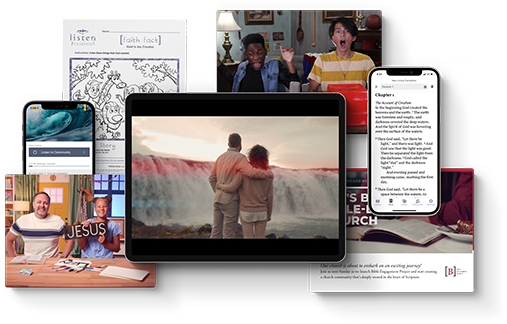Thinking Biblically about Mental Health for Adults
Por | Publicado en Qué dice la Biblia
The following is a quick guide for adults created in partnership with a licensed professional counselor.
• One in four U.S. adults experiences a diagnosable mental disorder every year, according to the National Institute of Mental Health, making mental disorders the leading cause of disability in the United States. That means there are multitudes struggling in church.
• Christians have typically viewed mental illness as a spiritual problem, assuming iniquity in the person's life led to the difficulties.
• The Bible doesn’t address mental health in the scientific, clinical way we do today. As a sacred text, the lines are often blurred between spiritual and physical challenges. Still, the careful reader will find that the biblical writers have incredible insight into emotions, personhood, suffering, wholeness, and human complexity.
• Biblical writers detailed their struggles with physical and psychological pain: The Book of Job details his faith in the face of extreme personal loss. The Psalms often address anxiety and reframe personal experience in light of God’s character. Jeremiah deals with the trauma of an entire nation and his personal responsibility to enter fully into it.
• Isaiah 52:13 to 53:12 describe a “Suffering Servant,” which can be seen through the lens of predictive prophecy as referring to Jesus. This is significant because when we suffer, we can know that Jesus also suffered on our behalf. He empathizes with our pain and died to redeem our experiences.
• The Bible does not offer a simple, universal answer for all mental health issues because these issues and our human nature are complex. Using just one, small segment of Scripture as an explanation for suffering can be misleading and harmful.
• Pray for people suffering with mental health issues, that they will find relief through the empathy of Jesus as evidenced through His followers and through seeking professional help when needed.
• Pray for the Church, that the body of Christ will be empathetic and discerning with individuals needing care, being heedful to interpret Scripture in context instead of picking out small segments that echo their perceptions.
• Practice active listening. The U.S. Institute of Peace has a handout here.
• Practice empathy. Influence magazine published an article on four ways empathy can positively impact your ministry here.
• Educate church leaders on how to initially help those who are suffering, and consider a partnership between a local counseling center and your local church.
• Here are some books on mental health for adults suggested by licensed professional counselor Leah Wilson:
* Anatomy of the Soul by Curt Thompson
* Changes That Heal by Henry Cloud
* Grace for the Afflicted by Matthew S. Stanford
* Healing for Damaged Emotions by David A. Seamands
* How People Grow by Henry Cloud and John Townsend
* Managing Leadership Anxiety: Yours and Theirs by Steve Cuss
* Mental Health and the Church by Stephen Grcevich, MD
* Out of the Cave by Chris Hodges
* The Body Keeps the Score by Bessel van der Kolk, MD
* The Healing Path by Dan B. Allender
* The Soul of Shame by Curt Thompson
* The Wounded Heart by Dan B. Allender
What this is about
• One in four U.S. adults experiences a diagnosable mental disorder every year, according to the National Institute of Mental Health, making mental disorders the leading cause of disability in the United States. That means there are multitudes struggling in church.
• Christians have typically viewed mental illness as a spiritual problem, assuming iniquity in the person's life led to the difficulties.
What the Bible says
• The Bible doesn’t address mental health in the scientific, clinical way we do today. As a sacred text, the lines are often blurred between spiritual and physical challenges. Still, the careful reader will find that the biblical writers have incredible insight into emotions, personhood, suffering, wholeness, and human complexity.
• Biblical writers detailed their struggles with physical and psychological pain: The Book of Job details his faith in the face of extreme personal loss. The Psalms often address anxiety and reframe personal experience in light of God’s character. Jeremiah deals with the trauma of an entire nation and his personal responsibility to enter fully into it.
• Isaiah 52:13 to 53:12 describe a “Suffering Servant,” which can be seen through the lens of predictive prophecy as referring to Jesus. This is significant because when we suffer, we can know that Jesus also suffered on our behalf. He empathizes with our pain and died to redeem our experiences.
• The Bible does not offer a simple, universal answer for all mental health issues because these issues and our human nature are complex. Using just one, small segment of Scripture as an explanation for suffering can be misleading and harmful.
Ways to pray
• Pray for people suffering with mental health issues, that they will find relief through the empathy of Jesus as evidenced through His followers and through seeking professional help when needed.
• Pray for the Church, that the body of Christ will be empathetic and discerning with individuals needing care, being heedful to interpret Scripture in context instead of picking out small segments that echo their perceptions.
Ways for your congregation or small group to take action
• Practice active listening. The U.S. Institute of Peace has a handout here.
• Practice empathy. Influence magazine published an article on four ways empathy can positively impact your ministry here.
• Educate church leaders on how to initially help those who are suffering, and consider a partnership between a local counseling center and your local church.
For further reading
• Here are some books on mental health for adults suggested by licensed professional counselor Leah Wilson:
* Anatomy of the Soul by Curt Thompson
* Changes That Heal by Henry Cloud
* Grace for the Afflicted by Matthew S. Stanford
* Healing for Damaged Emotions by David A. Seamands
* How People Grow by Henry Cloud and John Townsend
* Managing Leadership Anxiety: Yours and Theirs by Steve Cuss
* Mental Health and the Church by Stephen Grcevich, MD
* Out of the Cave by Chris Hodges
* The Body Keeps the Score by Bessel van der Kolk, MD
* The Healing Path by Dan B. Allender
* The Soul of Shame by Curt Thompson
* The Wounded Heart by Dan B. Allender



